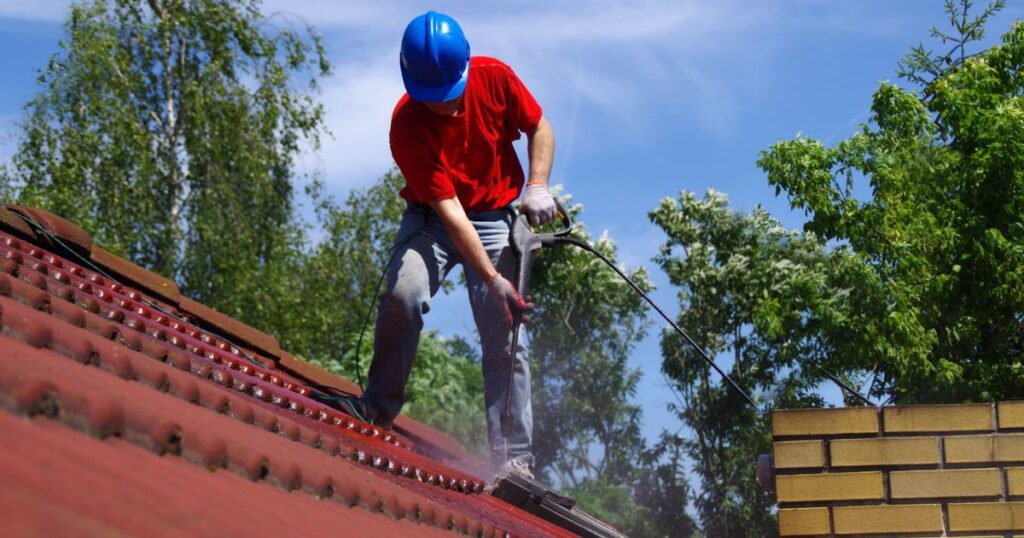Keeping a home’s exterior clean enhances its curb appeal and preserves the integrity of the building materials. Over time, dirt, grime, mold, and algae can build up on the surfaces, potentially leading to long-term damage.
Homeowners often decide between two popular methods for exterior cleaning on deals and promotions: soft washing and pressure washing. Both techniques offer distinct advantages, but they differ significantly in approach, effectiveness, and suitability for various surfaces.
Read on to compare exterior home cleaning options.
Contents
Table of Contents
ToggleWhat Is Soft Washing?
Soft washing is a cleaning method that utilizes low-pressure water and formulated cleaning solutions to break down algae, dirt, mold, and other contaminants. Unlike pressure washing, soft washing is designed to clean surfaces gently, making it ideal for more fragile materials like stucco, siding, and roofing.
The cleaning solutions used in soft washing are typically biodegradable and environmentally friendly. They target the roots of algae, mold, and mildew, which cleans the surface and prevents the contaminants from quickly returning.
Benefits of Soft Washing
Furthermore, one of the main advantages of soft washing is its ability to clean delicate surfaces without causing damage. Since it uses low pressure, there’s no risk of water penetration or surface etching, which can occur with pressure washing. This makes it the preferred method for cleaning vinyl siding, roofs, and other materials that could be harmed by high pressure.
Lastly, incorporating soft washing into a regular home maintenance routine can help extend the life of building materials by preventing the deterioration caused by accumulated dirt and grime. For instance, if you’re looking for professional soft washing services, reputable providers like LA Softwash can provide specialized cleaning that targets tough exterior stains while protecting delicate surfaces.
Drawbacks of Soft Washing
While soft washing is gentle and effective, some surfaces or cleaning needs may be better options. Soft washing might not have the power to remove deeply embedded stains or thick layers of grime from hard surfaces like driveways or concrete patios. In those cases, pressure washing might be a better alternative.
Moreover, because soft washing involves chemical solutions, ensuring these products are safe for the surrounding environment is essential.
What Is Pressure Washing?
Pressure washing involves using high-pressure water to blast away dirt, debris, mold, and other contaminants from surfaces. It’s a powerful cleaning method commonly used for hard surfaces such as concrete driveways, patios, and brick walls. The equipment used for pressure washing generates pressure from 1,500 to 4,000 pounds per square inch (PSI), depending on the job’s needs.
Benefits of Pressure Washing
One of the primary benefits of pressure washing is its effectiveness in removing stubborn grime and buildup from harsh surfaces. This aggressive cleaning method can benefit driveways, sidewalks, and other areas exposed to heavy foot or vehicle traffic.

Moreover, pressure washing can quickly remove mold and mildew from surfaces that aren’t easily damaged, such as stone or brick. Pressure washing is also a time-efficient method. The high-powered water stream can cover large areas in a short amount of time, making it ideal for extensive cleaning tasks.
Drawbacks of Pressure Washing
Despite its effectiveness, pressure washing comes with certain drawbacks. The high pressure can damage more delicate materials, such as vinyl siding, wooden decks, or roofing shingles. This forceful approach may cause water to penetrate cracks or crevices, leading to potential structural issues, such as wood rot or mold growth beneath the surface.
Another consideration is the skill required to operate pressure washing equipment. Improper use of a pressure washer can result in uneven cleaning, surface damage, or injury.
Comparing Applications: Where Soft Washing and Pressure Washing Shine
Regarding exterior home cleaning, soft and pressure washing offer distinct advantages depending on the surface. Understanding where each technique shines can help you choose the right option.
Here’s a comparison between soft and pressure washing:
Driveways and Concrete Surfaces
When it comes to cleaning driveways and other concrete surfaces, pressure washing typically reigns supreme. The high-pressure stream is able to remove dirt, oil stains, tire marks, and even mildew from tough surfaces. Concrete can handle the powerful blast of a pressure washer without sustaining damage, making it an ideal candidate for this method.
In contrast, soft washing may be less effective at removing the embedded grime from concrete. While it can clean surfaces like brick walkways or lightly soiled patios, pressure washing is better suited for handling heavier dirt buildup on harder materials.
Roofs and Siding
For cleaning roofs and siding, soft washing is generally the safer and more effective method. Roof shingles can be easily damaged by the intense pressure of a pressure washer, leading to broken shingles or water intrusion. Soft washing’s low-pressure water, combined with cleaning solutions, ensures a thorough clean without risking damage to these materials.

Vinyl siding can also benefit from soft washing, as pressure washing can cause cracks or warping in the siding. Soft washing can help remove dirt, algae, and mildew while protecting the siding’s integrity.
Decks and Wood Surfaces
Soft washing is often the better choice for wooden decks and fences. High-pressure water can splinter wood, strip paint, or force moisture into the wood fibers, causing long-term damage. Soft washing provides a gentler clean that won’t harm the wood while removing dirt and algae. However, pressure washing can be used on harder woods like cedar or redwood, but with caution.
Conclusion
When deciding between soft washing and pressure washing, consider the type of surfaces that need cleaning, the extent of the dirt or grime buildup, and the potential for damage. Soft washing is often the safer and more effective method for more delicate surfaces such as roofs, siding, and wood.
In contrast, pressure washing is better suited for heavy-duty cleaning of hard surfaces like concrete driveways and brick patios. Lastly, by keeping the information mentioned above in mind, you can find the right cleaning method for your property.

